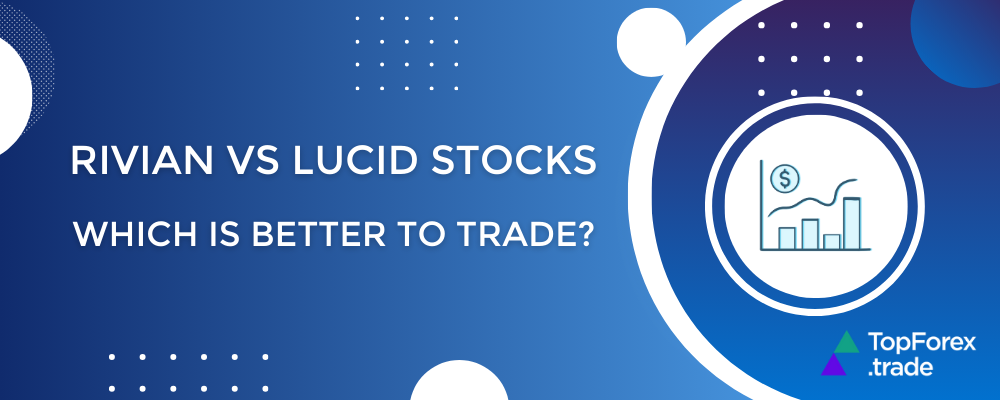The next Tesla? Analyzing Rivian and Lucid stocks trading potential

As Tesla continues to dominate the electric vehicle (EV) market, competitors like Rivian and Lucid Motors are gaining traction. With innovative designs, strong financial backing, and ambitious growth plans, these companies present intriguing opportunities for investors. But are Rivian or Lucid worth trading? This article examines their potential, risks, and how they stack up in the fast-evolving EV race.
Rivian: the electric adventure brand

Why Rivian stands out
Rivian has positioned itself as the EV of choice for outdoor enthusiasts. Its flagship models – the R1T pickup truck and R1S SUV – boast rugged designs, long-range capabilities, and off-road performance. Additionally, Rivian has a major deal with Amazon to produce 100,000 electric delivery vans, providing a steady revenue stream.
Stock performance and challenges
- Rivian went public in November 2021 with massive hype, reaching a market cap of over $100 billion – briefly surpassing Ford and GM.
- Since then, the stock has seen volatility, dropping significantly due to production delays, supply chain issues, and high cash burn.
- However, with strong institutional backing (Amazon and Ford are major investors) and a growing order book, Rivian could be a long-term play if execution improves.
Is Rivian a buy?
- Bull case: Strong brand loyalty, Amazon partnership, and first-mover advantage in electric adventure vehicles.
- Bear case: High production costs, competition from Tesla’s Cybertruck and Ford’s F-150 Lightning, and profitability concerns.
Lucid Motors: the luxury Tesla challenger

Why Lucid stands out
Lucid Motors is targeting the luxury EV market, directly competing with Tesla’s Model S. The Lucid Air boasts industry-leading range (up to 516 miles on a single charge), ultra-fast charging, and premium interiors. Backed by Saudi Arabia’s Public Investment Fund (PIF), Lucid has deep pockets for expansion.
Stock performance and challenges
- Lucid went public via SPAC in 2021, peaking at over $55 per share before dropping sharply.
- Like Rivian, Lucid has faced production bottlenecks and missed delivery targets, hurting investor confidence.
- However, its technology (battery efficiency, powertrain) is considered superior, giving it an edge in the high-end EV space.
Is Lucid a buy?
- Bull case: Best-in-class technology, strong Saudi backing, and high demand in the luxury segment.
- Bear case: Slower production ramp-up, niche market focus, and competition from Tesla, Mercedes, and BMW.
Rivian vs. Lucid: which is the better trade?
| Factor | Rivian (RIVN) | Lucid (LCID) |
|---|---|---|
| Market focus | Adventure/Utility | Luxury/Sedans |
| Backing | Amazon, Ford | Saudi PIF |
| Production | Scaling up | Slower ramp-up |
| Competition | Tesla Cybertruck, Ford Lightning | Tesla Model S, Mercedes EQE |
| Risk level | High (cash burn) | High (niche market) |
Short-term vs. long-term play
- Short-term traders: Both stocks are highly volatile, making them potential candidates for swing trading based on news (earnings, delivery numbers).
- Long-term investors: Rivian may have broader appeal due to its Amazon deal, while Lucid could dominate the luxury segment if execution improves.
Disclaimer: This is not financial advice. Always conduct your own research before investing.
Best Brokers to Trade EV Stocks (Including Rivian and Lucid)
As electric vehicle (EV) stocks like Rivian (RIVN) and Lucid (LCID) gain traction, choosing the right broker is crucial for maximizing opportunities while managing risks. Below is an in-depth comparison of the top brokers for trading EV stocks, including commissions, trading platforms, leverage, and unique features.
🎯 Pro tip: Use demo accounts to test trading strategies risk-free before committing capital.
eToro – best for Social and Copy trading
- Regulation: FCA, CySEC, ASIC
- Stock trading: Commission-free (spread included)
- Fractional shares: Yes (invest from $10)
- Leverage: Up to 5x (for CFD trading)
- Unique feature: CopyTrader – Mirror top EV stock traders
- Best for: Beginners and long-term investors
Risk disclaimer: eToro is a multi-asset platform which offers both investing in stocks and cryptoassets, as well as trading CFDs.
CFDs are complex instruments and come with a high risk of losing money rapidly due to leverage. 61% of retail investor accounts lose money when trading CFDs with this provider. You should consider whether you understand how CFDs work, and whether you can afford to take the high risk of losing your money.
This communication is intended for information and educational purposes only and should not be considered investment advice or investment recommendation. Past performance is not an indication of future results.
Copy Trading does not amount to investment advice. The value of your investments may go up or down. Your capital is at risk.
Don’t invest unless you’re prepared to lose all the money you invest. This is a high-risk investment and you should not expect to be protected if something goes wrong. Take 2 mins to learn more.
eToro USA LLC does not offer CFDs and makes no representation and assumes no liability as to the accuracy or completeness of the content of this publication, which has been prepared by our partner utilizing publicly available non-entity specific information about eToro.
XTB – lowest-cost broker for EV stocks
- Regulation: FCA, CySEC, KNF
- Stock trading: 0% commission (only FX conversion fee)
- Platform: xStation 5 (advanced charts, economic calendar)
- Leverage: Up to 1:5 (for CFDs)
- Unique feature: Free real-time market sentiment data
- Best for: Low-cost traders and technical analysts
AvaTrade – best for MetaTrader users
- Regulation: Central Bank of Ireland, ASIC, FSCA
- Stock trading: Spread-based
- Platforms: MT4, MT5, AvaTradeGO
- Leverage: Up to 1:5 (retail), 1:400 (pro traders)
- Unique feature: Automated trading via Expert Advisors (EAs)
- Best for: Algorithmic traders and forex/stock combi traders
Plus500 – best for short-term CFD traders
- Regulation: FCA, ASIC, CySEC
- Stock trading: CFD-only (no physical ownership)
- Fees: Tight spreads, no commissions
- Leverage: Up to 1:30 for retail traders
- Unique feature: Guaranteed stop-loss (no slippage)
- Best for: Swing traders hedging EV stock volatility
79% of retail investor accounts lose money when trading CFDs with this provider. You should consider whether you can afford to take the high risk of losing your money.
Plus500EE AS is authorised and regulated by the Estonian Financial Supervision and Resolution Authority (Licence No. 4.1-1/18).
BlackBull Markets – best ECN trading for active traders
- Regulation: FMA (NZ), FSA (Seychelles)
- Stock trading: Limited selection (mostly forex & commodities)
- Platform: MT4, MT5, BlackBull Trade
- Leverage: Up to 1:500 (for forex, lower for stocks)
- Unique feature: Raw ECN spreads (from 0.0 pips)
- Best for: High-frequency traders and scalpers
Related articles:
Rivian vs. Lucid stock trading - FAQ